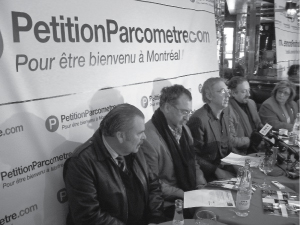Some downtown business-owners came out swinging on Wednesday, saying the Tremblay administration has lost control over its employees and is driving people out of the heart of the city with overbearing regulations.
Led by restaurateur Alain Creton, the coalition launched an internet petition and collected signatures from representatives of almost all major businesses between Bishop and Peel. Petitionparcometre.com invites Montrealers to join their call for a return to free parking on weekends, as well as on Monday to Wednesday evenings. They’re also calling for a three-hour time limit, as opposed to the two hours now allowed in high-traffic areas.
“The city says it’s always the same people who complain. So, I went to speak to downtown merchants one by one,” said Creton, owner of Chez Alexandre on Peel St. “We want to be heard. Downtown could become an area that people won’t want to visit anymore.”
 En plus de commerçants importants, Creton affirme qu’il a reçu l’appui de plusieurs hauts responsables d’organismes tel Tourisme Montréal, Destination Centre-Ville et l’Association des restaurateurs du Centre-Ville. Durant la conférence de presse de mercredi dernier, il était aux côtés de Beryl Wajsman, directeur du Métropolitain, en tant que président de l’Institut d’Affaires Publiques de Montréal, celui-ci ayant participé à l’organisation de la première initiative citoyenne anti-parcomètres, qui a consisté en une pétition ayant rassemblé jusqu’à présent plus de 25 000 signatures.
En plus de commerçants importants, Creton affirme qu’il a reçu l’appui de plusieurs hauts responsables d’organismes tel Tourisme Montréal, Destination Centre-Ville et l’Association des restaurateurs du Centre-Ville. Durant la conférence de presse de mercredi dernier, il était aux côtés de Beryl Wajsman, directeur du Métropolitain, en tant que président de l’Institut d’Affaires Publiques de Montréal, celui-ci ayant participé à l’organisation de la première initiative citoyenne anti-parcomètres, qui a consisté en une pétition ayant rassemblé jusqu’à présent plus de 25 000 signatures.
Creton, qui est d’origine française, a également eu des mots très durs pour les membres du personnel chargés de la surveillance des parcomètres – les oignons verts – lesquels, selon lui, se montrent parfois « arrogants, vulgaires et disgracieux. Ils sont agressifs et frappent sans avertissement. Ils n’ont pas du tout les mêmes dispositions amicales que ceux qui m’ont accueilli lorsque je me suis établi au Québec. »
Il ajoute qu’il remarque régulièrement des oignons verts, sur la rue Peel, en train d’attendre que les parcomètres expirent, pour aussitôt infliger des amendes aux automobilistes. Une brève marche sur cette rue très achalandée du Centre-Ville permet de constater d’une manière assez évidente que les amendes sont très répandues, avec plusieurs pare-brises arborant des contraventions. Creton et d’autres commerçants avaient également tenu une conférence de presse le mois dernier sur la même question. Deux jours plus tard, le restaurateur se vit infliger une amende de $ 500 pour avoir enfreint un règlement sur les contenants à ordures.
« Ils m’ont envoyé un huissier dans le but évident de me faire taire », a déclaré Creton, selon lequel la hausse constante des tarifs de stationnement et les amendes agressivement imposées pour de prétendues atteinte à la propreté constituent des taxes déguisées. C’est du vol. »
“It’s senseless for my clients to walk out to put money in the meter,” said Restaurant La Molisana owner Giovanna Giancaspro, who wants the double-dipping to stop (the city can charge for the same spot, at the same time as cars come and go). She said she doesn’t even shop downtown anymore since there is plenty of free parking on the West Island. “I’m hurting. Everybody is feeling it,” she added. Her business hasn’t seen drastic reductions, she said, because “three restaurants on my street (Fleury St.) have closed down. I have parking next door; I’m doing this on principle.”
Luis Miranda, the Montreal executive committee member in charge of economic development and citizen services, said he was open to sitting down with opponents of the parking system two weeks ago, but the meeting has not taken place as of yet. Miranda said he recognized that “the difficult economic situation has had a negative impact on the bottom line of many [downtown businesses]. We also have to recognize that competition is more and more intense between Montreal and commercial zones in the suburbs.”
Councilor Marvin Rotrand, who also works on the parking dossier, questions whether the majority of downtown merchants support Creton’s initiative.
“The bulk of the merchants accept the city’s measures,” Rotrand told The Métropolitain. When rates were raised, “the city wanted to do two things: Have a better rotation of vehicles to help businesses…and to favour at least a partial transfer to public transit. And that has happened.”
“Montreal has some of the most generous parking policies of any major city,” added Rotrand. “It’s not that the city is anti-car, just pro-public transit. We will not ban the car.”

























Comments
Please login to post comments.